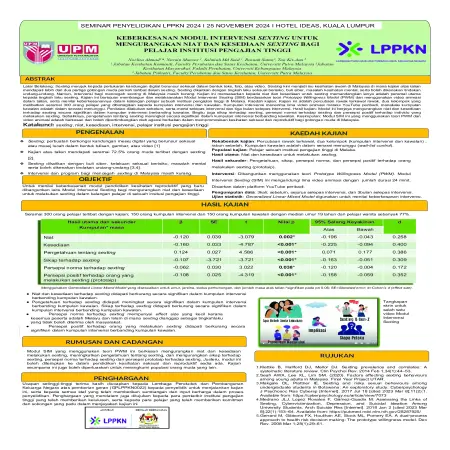| Abstract |
Sexting refers to the exchange of sexually explicit content in the form of texts, photos, or videos. Sexting has become a public health issue in Malaysia, where online studies show that more than two-thirds of young people have engaged in sexting. Sexting is associated with risky sexual behavior, cyberbullying, mental health issues, and may lead to legal consequences. However, interventions to prevent sexting in Malaysia are still lacking. This study targets the intention and willingness to sext as these are key predictors of sexting behavior. The aim of this study is to develop and implement a Sexting Intervention Module (SIM) based on the Prototype Willingness Model (PWM) theory, using online animated videos, and to evaluate its effectiveness among students at a higher education institution in Melaka.
Study Method: This study is a randomized controlled trial involving 300 students divided into intervention and control groups. The intervention group received five animated videos via a private YouTube link, while the control group was placed on a waiting list. Assessments were made before, immediately after, and three months after the intervention.
Study Results: The module successfully reduced the intention and willingness to sext significantly in the intervention group compared to the control group. Similarly, attitudes towards sexting, perceived norms about sexting, and positive perceptions towards individuals engaging in sexting were also significantly reduced. On the other hand, knowledge about sexting increased significantly in the intervention group compared to the control group. Conclusion: The SIM module, which uses PWM theory and animated videos, is effective and can be considered by relevant agencies to promote sexual and reproductive health among young people in Malaysia. |





